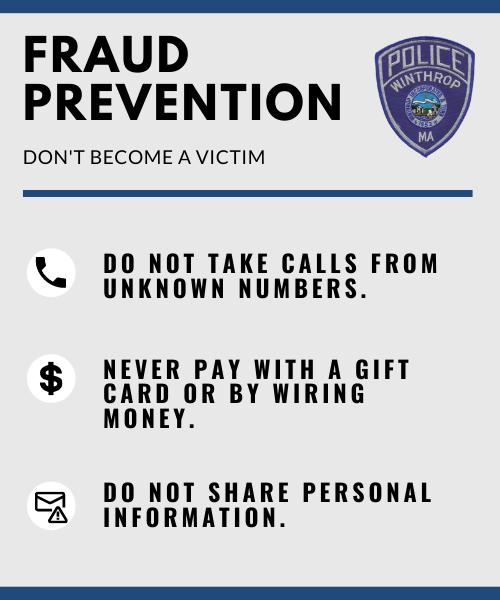Winthrop Police Department Warns Residents of Gift Card Scams

Chief Terence M. Delehanty and the Winthrop Police Department wish to warn the public about gift card scams.
On Wednesday, July 22, it was reported that an elderly Winthrop woman was attempting to purchase several thousand dollars worth of gift cards at CVS Pharmacy to send to a new government program.
Believing that the woman was a victim of fraud, staff immediately notified the Winthrop Police Department, who confirmed that this was a scam.
Chief Delehanty would like to remind residents that the government will never contact anyone through text message and will never request gift cards as payment.
Additionally, within the past 90 days the Winthrop Police Department have also received 18 reports of identity fraud.
Chief Delehanty also warns that residents should NEVER give personal information, social security numbers or credit card numbers to people through social media, or to people who call their homes or cell phones unsolicited.
“We would like to commend the CVS employees who immediately notified us of this situation,” Chief Delehanty said. “It is crucial to be vigilant and wary of anyone requesting payment in an illegitimate form, such as gift cards, so that you do not become a victim of this type of scam.”
The Federal Trade Commission (FTC) warns of the following types of gift card scams:
- Utility Scam: Scammers pretending to be from a utility company, telling you to pay your bill by gift card or they’ll cut off your power or water.
- Online Auctions: Sellers on online auction sites who ask for gift cards to “buy” big items like cars, motorcycles, boats, RVs, tractors and electronics.
- Service-Member Scam: Scammers pose as a service-member to get your sympathy, saying they have to sell something quickly before deployment and needs you to pay by gift card.
- Sweepstakes: Callers who say you’ve won a prize, for a sweepstakes you probably never entered – but first, you have to use a gift card to pay fees or other charges.
- Checks: Someone buying something from you, probably online, who sends a check for more than the purchase price – and asks you to give them the difference on a gift card.
Sending money via money order or pre-paid debit card is as good as sending cash, and if money is sent to a criminal, it is gone forever and cannot be recovered.
To help prevents similar scams, the FTC recommends the following:
- Do not take calls from unknown numbers. Caller ID is not always accurate. A call from a “local” number might not be coming from a local person or organization.
- Do not share personal, identifying information like social security numbers, account numbers, or mother’s maiden names.
- Never pay with a gift card or by wiring money.
- Be wary of sellers who talk quickly and pressure you to make a decision quickly.
- Do not buy a product or service because of a “free gift.”
- Get all information in writing before making a purchase.
- Verify the legitimacy of a charity before donating.
- Before making an investment that a caller or email sender is offering, check with the state securities regulator to make sure the offer is properly registered.
- Do not send cash by messenger, overnight mail, or money transfer. If you pay for a product or service with cash or a money transfer, you run a risk of losing the right to dispute fraudulent charges.
- Don’t accept an offer that requires a registration or shipping fee to get a prize or gift.
- Beware of offers to “help” recover money that you already have lost. Scammers sometimes pose as law enforcement officers who will help get money back for a fee.
- Tell the Federal Trade Commission about any type of scam or fraud you detect at ftc.gov/complaint, or call toll-free: 1-877-FTC-HELP.
If anyone has questions or believes they have been victimized, they are encouraged to call the Winthrop Police Department at 617-846-1212.
###
